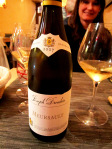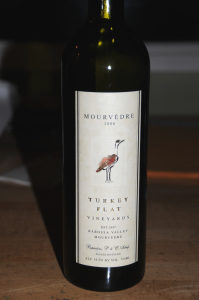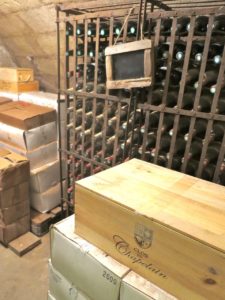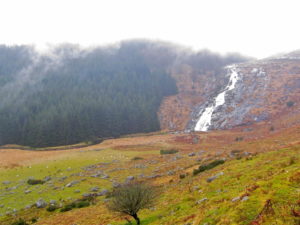My siblings recently sent copies of poems we read while growing up, a few of which we had to memorize (as required) for school. These included Ozymandias (King of Kings) by Shelley, and Fair Daffodils by Robert Herrick. There was also mention of Poems on the Underground in the UK (where passengers appreciated poetry placed on billboards), as well as Poetry in Motion, where the same took place along New York’s public transport system.

Good verse includes compact, powerful imagery that hits our emotions. Poetry is the literary equivalent of – ? Perhaps Red Bull. Or whiskey. Maybe wine.
During the opening scene of the classic movie Bottle Shock, a helicopter cruises over hills and vineyards while a voice recalls words of the writer Robert Louis Stevenson (which are also written on the entrance sign to Napa, California), that ‘Wine is bottled poetry.’

Shakespeare never doubted the power of the grape, and in Antony and Cleopatra wrote:
Come, thou monarch of the vine,
Plumpy Bacchus with pink eyne
In thy fats our cares be drown’d,
With thy grapes our hairs be crown’d!
Cup us till the world go round,
Cup us till the world go round!
John Keats’s wrote Wine Poem: Women, Wine, and Snuff
Give me women, wine and snuff
Until I cry out “hold, enough!”
You may do so sans objection
Till the day of resurrection;
For bless my beard they aye* shall be
My beloved Trinity.
[* always shall be]
 Wine is often intertwined with romance; Robert Burns wrote of wine and his beloved woman at the beginning of his poem about departing for battle:
Wine is often intertwined with romance; Robert Burns wrote of wine and his beloved woman at the beginning of his poem about departing for battle:
Go fetch to me a pint o wine,
And fill it in a silver tassie;
That I may drink, before I go,
A service to my bonie lassie:
Jonathan Swift wrote about the power of an empty wine bottle, unearthed in 1722, in Stella’s Birthday – describing it as though it were a womb containing medicine.
Behold the bottle, where it lies
With neck elated toward the skies!
The god of winds and god of fire
Did to its wondrous birth conspire;
And Bacchus for the poet’s use
Pour’d in a strong inspiring juice.
See! as you raise it from its tomb,
It drags behind a spacious womb,
And in the spacious womb contains
A sovereign medicine for the brains.
 Part of the poem Ode to Wine, by Pablo Neruda, is below. This Chilean romantic had homes in both the city of Valparaiso, as well as along the coast of Chile. I was fortunate enough to visit both when I began writing Vino Voices years ago. Inside his beach house we learned how Neruda, renowned lover and poet, drank wine out of multi-colored glasses because he believed they changed a wine’s flavor.
Part of the poem Ode to Wine, by Pablo Neruda, is below. This Chilean romantic had homes in both the city of Valparaiso, as well as along the coast of Chile. I was fortunate enough to visit both when I began writing Vino Voices years ago. Inside his beach house we learned how Neruda, renowned lover and poet, drank wine out of multi-colored glasses because he believed they changed a wine’s flavor.

My darling, suddenly
the line of your hip
becomes the brimming curve
of the wine goblet,
your breast is the grape cluster,
your nipples are the grapes,
the gleam of spirits lights your hair,
and your navel is a chaste seal
stamped on the vessel of your belly,
your love an inexhaustible
cascade of wine,
light that illuminates my senses,
the earthly splendor of life.
Want to invest in a decent book of poetry? Consider the classic Norton Anthology of Poetry, a serious tome to plonk beside your nightstand. 100 Best-Loved Poems, a bit slimmer, includes more classics than contemporary verse. My favorite, because it’s a paperback stuffed with verse, and also light enough to have packed away for a two-year trip to Africa with the Peace Corps years ago, is Immortal Poems of the English Language.
Next time you’re alone with a glass of wine, turn off the TV. Try enjoying some verse instead.





jlcollinsnh
23 Aug 2014And perhaps the greatest of all, and one I recited in college, Shakespeare’s Falstaff:
Good faith, this same young sober-blooded boy doth
love me; nor a man cannot make him laugh—but that’s no marvel,
he drinks no wine.
There’s never none of these demure boys come
to any proof; for thin drink doth so over-cool their blood and making many fish-meals, that they fall into a kind of male
green-sickness; and then, when they marry, they get wenches.
They are generally fools and cowards-which some of us should be too
but for inflammation.
A good sherris-sack hath a two-fold
operation in it. It ascends me into the brain; dries me there
the foolish and dull and crudy vapours which environ it; makes it
apprehensive, quick, forgetive, full of nimble, fiery, and
delectable shapes; which delivered o’er to the voice, the tongue, Which is the birth, becomes excellent wit.
The second property of
your excellent sherris is the warming of the blood; which, before
cold and settled, left the liver white and pale, which is the
badge of pusillanimity and cowardice; but the sherris warms
and makes it course from the inwards to the parts extreme.
It illumineth the face, which, as a beacon, gives warning to all
rest of this little kingdom, man, to arm; and then the vital
commoners and inland petty spirits muster me all to their
captain, the heart, who, great and puff’d up with this retinue, doth any deed of courage—and this valour comes of sherries.
So that that skill in the weapon is nothing without sack, for that sets
it a-work; and learning, a mere hoard of gold kept by a devil
till sack commences it and sets it in act and use.
Hereof comes it that Prince Harry is valiant; for the cold blood he did
naturally inherit of his father, he hath, like lean, sterile and
bare land, manured, husbanded, and tilled with excellent
endeavour of drinking good and good store of fertile sherris,
that he is become very hot and valiant.
If I had a thousand sons the first humane principle I would teach them should be to
forswear thin potations and to addict themselves to sack.
vinoexpressions
26 Aug 2014Thanks for the contrinution Jim! Love it. And a brother reminded me of another – Homer’s Odysseus on the ‘wine dark sea.’ Cheers to Verse and Vino…